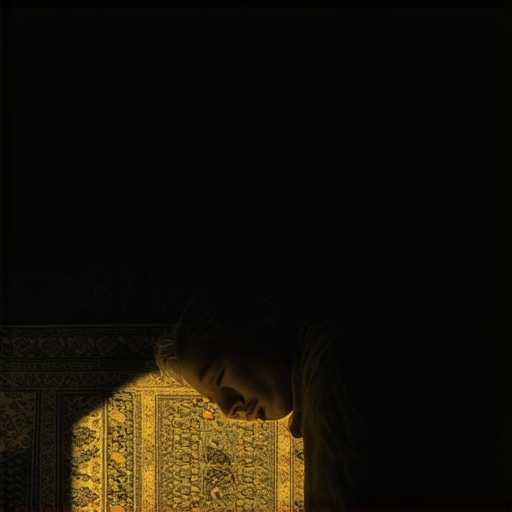My Journey into the World of Dream Interpretation in Islam
Ever since I was a young child, I found myself captivated by the dreams I experienced, often waking up with a sense of wonder and curiosity. Over the years, I realized that dreams in Islam are not mere illusions but carry profound spiritual messages. This realization sparked my personal quest to understand how to interpret dreams in accordance with Islamic teachings and prophetic traditions.
Understanding Dreams: A Personal Reflection on Islamic Perspectives
Islamic dreams are considered a window into the unseen, offering insights into our spiritual state and future events. I learned that the Prophet Muhammad (peace be upon him) emphasized the importance of righteous dreams and their interpretations. According to Islamic scholars, dreams can be categorized into three types: true dreams, false dreams, and dreams influenced by Nafs (self). Recognizing these helps in discerning meaningful messages from mere illusions.
Essential Tips for Interpreting Dreams in Islam
From my experience, the key to interpreting dreams in Islam lies in sincerity, patience, and seeking divine guidance. I always remind myself to pray for clarity (istikhara) before analyzing a dream, and to avoid jumping to conclusions. Consulting authentic Islamic sources, such as the Islamic dream dictionary, has been invaluable. Additionally, remembering that some dreams are tests or warnings from Allah helps maintain humility and trust in divine wisdom.
How Do Prophetic Symbols Illuminate Our Dreams?
One of the most intriguing aspects I encountered was the symbolism found in Islamic dreams. For example, dreaming of water often signifies purity and spiritual renewal, while a snake might symbolize temptation or danger. I found that understanding these symbols requires deep reflection and knowledge of prophetic traditions. I often refer to authoritative sources, like interpretations of dreams about losing teeth, to deepen my understanding.
Why Do Certain Dreams Recure and How Can We Find Their Hidden Messages?
This question has always fascinated me. Recurring dreams often indicate unresolved issues or persistent spiritual concerns. To decode their hidden messages, I recommend maintaining a dream journal and seeking Allah’s guidance through prayer. Engaging with knowledgeable scholars or trusted Islamic literature can also shed light on complex symbols and themes, helping us align our lives with divine will.
If you’ve experienced vivid dreams or spiritual visions, I invite you to share your experiences in the comments below. Exploring these together can deepen our understanding of divine messages and strengthen our faith.
For a more detailed exploration of prophetic dreams, I recommend reading prophetic dreams in Islam, which offers valuable insights into recognizing divine messages in our dreams.
Deciphering the Mysteries of Recurring Dreams in Islam
Recurring dreams are a fascinating phenomenon that often indicate unresolved inner conflicts or persistent spiritual messages from Allah. As an Islamic dream expert, I have observed that these dreams tend to revisit us until we address their underlying meanings. For instance, repeatedly dreaming of water could symbolize a spiritual cleanse or an urge for renewal, echoing the significance of dreams about water in Islam. Recognizing these patterns allows us to seek divine guidance more intentionally and take actionable steps towards spiritual growth.
What do recurring dreams reveal about our Nafs and divine testing?
Recurring dreams often serve as a mirror reflecting our Nafs (self) struggles and the tests Allah places in our path. They might symbolize unresolved sins, unfulfilled obligations, or areas where we need to strengthen our faith. The Prophet Muhammad (peace be upon him) emphasized that dreams could be a form of divine communication, especially when they recur, prompting us to reconsider our intentions and actions. Practicing patience and prayer, such as seeking refuge from bad dreams in Islam, can help us comprehend these messages more clearly. Keeping a detailed dream journal and consulting knowledgeable scholars can further elucidate the symbolism behind these recurring visions, especially when they involve significant elements like animals, symbols, or divine signs.
Integrating Prophetic Symbols for Practical Dream Interpretation
Prophetic symbols play a crucial role in understanding the messages embedded within dreams. For example, dreaming of a mountain signifies strength and perseverance, aligning with the prophetic tradition of mountains representing steadfastness. Similarly, dreams of the moon often relate to divine guidance and spiritual enlightenment, as discussed in dreaming of the moon in Islam. Recognizing these symbols within your dreams can offer profound insights into your spiritual journey and future challenges. It’s vital to approach these symbols with a nuanced mindset, considering the context of the dream and your current life circumstances. Consulting trusted sources and scholars enriches this interpretative process, helping you navigate complex dream themes with clarity and confidence.
How Can We Differentiate Between True Divine Dreams and Illusions?
This is a question many seekers ponder deeply. In Islamic tradition, true divine dreams tend to be clear, peaceful, and align with Islamic teachings, often leaving a lingering sense of reassurance. Conversely, illusions or false dreams may evoke fear, confusion, or contradict divine guidance. The Prophet Muhammad (peace be upon him) taught that sincere believers should seek refuge from the whispers of Shaytan and pray for clarity, especially when unsure about a dream’s authenticity. Developing a routine of Islamic dream etiquette and seeking knowledge from authentic sources can help in accurately discerning the divine from the deceptive. Remember, Allah guides whom He wills, and sincere supplication is key to understanding the messages veiled within dreams.
If you’ve experienced dreams that seem to carry a deeper message, I encourage you to share your insights or questions in the comments. Engaging with a community of like-minded believers enhances our collective understanding and strengthens our faith journey.
For further exploration into the spiritual depths of dreams, I recommend reviewing comprehensive resources like dream interpretations about losing teeth and the symbolism of water in Islamic dreams. These sources offer invaluable insights for those seeking to decode divine messages accurately and deepen their spiritual awareness.
Deepening My Understanding of Prophetic Symbols in Dreams
As I continue my journey into the realm of Islamic dream interpretation, I realize that the symbols we encounter are more than mere images—they are gateways to divine messages and spiritual lessons. For instance, dreaming of water, a recurring theme in many of my visions, has taken on layered meanings beyond purity and renewal. Sometimes, it signifies a spiritual awakening, while at other moments, it hints at the need for patience and trust in Allah’s plan. Delving into the prophetic traditions, I discovered that symbols like water, mountains, and animals carry specific meanings, often linked to the principles of perseverance, faith, and divine guidance.
The Complexity of Symbols: More Than Meets the Eye
One of the most fascinating aspects I’ve encountered is how the same symbol can have different interpretations depending on the context of the dream and the individual’s spiritual state. For example, dreaming of a snake might symbolize danger or temptation, but it can also represent healing and protection if encountered in a positive context. This duality reminds me that Islamic dream interpretation requires not only knowledge but also intuition and sincerity. I often revisit trusted sources like the Islamic Dream Dictionary to cross-reference symbols, but I also rely on prayer and reflection to discern the true message intended for me.
How Do We Differentiate Between Divine and Deceptive Dreams?
This question has challenged me deeply, especially when dreams leave a lingering sense of confusion or fear. The Prophet Muhammad (peace be upon him) emphasized that true dreams are often peaceful, clear, and align with Islamic teachings. False dreams, on the other hand, may evoke anxiety or contradict divine guidance. To navigate this delicate space, I practice seeking refuge from Shaytan, praying for clarity, and engaging in sincere supplication. I also remind myself that Allah’s guidance is accessible through consistent worship and sincere intentions. Sharing our experiences and seeking advice from knowledgeable scholars can further help us distinguish divine messages from illusions. If you’ve ever experienced such dreams, I encourage you to share your insights or questions—sometimes, community wisdom can illuminate hidden meanings.
Integrating Symbols into Daily Spiritual Practice
As I reflect on the significance of prophetic symbols, I realize that understanding their meanings can profoundly impact our daily lives. Recognizing symbols such as the moon, which often signifies divine guidance, or mountains, representing steadfastness, helps me align my actions with spiritual principles. I have learned to keep a dream journal, recording every detail and seeking Allah’s guidance through prayer. This practice not only enhances my understanding but also deepens my connection with divine wisdom. Engaging with trusted Islamic scholars and literature, like the interpretations of dreams about the moon, enriches this journey, allowing me to approach dreams with both knowledge and humility.
Encouraging Personal Exploration and Community Sharing
If you have experienced dreams that you feel carry spiritual messages, I invite you to share your stories in the comments. Personal experiences often resonate more deeply when we hear others’ journeys, and collectively, we can uncover layers of meaning that might elude us alone. Exploring dreams together fosters a sense of community and shared faith, reminding us that divine guidance is always accessible to those who seek it sincerely. Remember, dreams are a gift from Allah, and with patience, prayer, and knowledge, we can unlock their profound messages.
Unlocking the Layers of Prophetic Symbols in Your Dreams
As I delve deeper into the intricacies of Islamic dream interpretation, I find that prophetic symbols often serve as multifaceted gateways to divine wisdom. For instance, dreaming of water, beyond its basic symbolism of purity, can embody spiritual renewal, a call for patience, or even a signal of impending divine mercy. Recognizing the nuances requires not only knowledge but also a refined intuition cultivated through consistent prayer and reflection. The prophetic traditions, such as those documented by scholars like Al-Nabulsi, emphasize that these symbols are layered, often requiring contextual interpretation aligned with one’s personal spiritual state. To explore these symbols comprehensively, consulting authentic sources like Islamic Dream Dictionary is invaluable. Their insights help unravel the complex messages embedded within dreams, guiding us toward spiritual growth and divine understanding.
How Can We Differentiate Between Genuine Divine Messages and Illusions?
This question has challenged many seasoned dream interpreters, including myself. True divine dreams tend to be serene, clear, and in harmony with Islamic teachings, often leaving a sense of reassurance and peace. Conversely, illusions or deceptive visions may evoke fear, confusion, or contradictions with divine guidance, often influenced by Shaytan. The Prophet Muhammad (peace be upon him) advised believers to seek refuge from Shaytan and to pray for clarity when uncertain. Developing a routine of Islamic dream etiquette—such as sincere supplication and seeking divine guidance—can significantly aid in discerning authentic messages. Engaging with knowledgeable scholars and authentic Islamic literature further sharpens this discernment, enabling us to navigate the spiritual landscape of dreams with confidence. If you’ve encountered dreams that feel layered with divine significance, I encourage you to share your experiences. Your insights could illuminate others’ paths and deepen our collective understanding of divine communication.
Connecting Symbols with Daily Spiritual Practices
Integrating prophetic symbols into our daily routines transforms abstract messages into actionable spiritual lessons. For example, recognizing the moon as a symbol of divine guidance encourages me to seek enlightenment in my daily prayers and reflections. Keeping a detailed dream journal, where I record symbols and contextualize their meanings through prayer, has become an essential part of my spiritual discipline. This practice enhances my intuitive understanding and aligns my actions with divine wisdom. Engaging with trusted scholars and authoritative sources, such as dreaming of the moon in Islam, enriches my interpretative framework, enabling me to approach dreams with both knowledge and humility. This holistic approach fosters a profound connection between my dreams and daily spiritual growth, allowing divine messages to guide my journey more effectively.
Deepening Reflection: Symbols in Context and Personal Spiritual States
One of the most profound realizations in my journey is that symbols are not static; their meanings shift based on context and individual spiritual circumstances. For instance, a snake might symbolize danger, but in certain contexts, it signifies healing or divine protection—an insight rooted in prophetic traditions and scholarly interpretations. This duality underscores the importance of sincerity, reflection, and contextual awareness in dream interpretation. Regularly revisiting trusted sources like Islamic Dream Dictionary combined with prayer helps me discern these subtleties. Developing this nuanced understanding allows for more accurate decoding of dreams, transforming them into meaningful spiritual lessons rather than mere images.
What Role Do Personal Spiritual States Play in the Interpretation of Recurring Dreams?
This is an area I’ve explored extensively. Recurring dreams often reflect unresolved inner conflicts or persistent spiritual lessons. Their interpretation depends heavily on the dreamer’s current state of piety, faith, and openness to divine guidance. For example, recurring dreams of water may symbolize ongoing purification or a call for patience, especially if the individual is engaged in spiritual struggles. To decode these messages, maintaining a dream journal and engaging in sincere supplication is essential. Consulting scholars familiar with Nafs-related dreams enhances this process, helping to reveal the deeper spiritual lessons. Recognizing these patterns empowers us to address underlying issues with humility and trust in Allah’s wisdom, fostering genuine spiritual progress.
Things I Wish I Knew Earlier: Surprising Truths About Islamic Dream Interpretation
Dreams Are More Than Just Nighttime Visions
Looking back, I wish I had understood sooner that dreams in Islam are sacred messages rather than random images. Recognizing their divine origin transformed my approach to interpreting dreams and deepened my faith. It’s amazing how Allah uses dreams to communicate guidance and warnings if we pay attention.
The Power of Sincerity and Piety
What truly changed my perspective was realizing that sincerity and piety are key when seeking to understand dreams. Praying istikhara before analyzing a dream helped me discern whether a message was genuine or influenced by Shaytan. This spiritual discipline creates a clear space for divine guidance to shine through.
Symbols Are Multifaceted and Context-Dependent
Understanding prophetic symbols requires more than memorizing meanings. I learned to consider the context of the dream and my personal spiritual state. For example, water can symbolize purity but also a spiritual test, depending on the circumstances. Reflecting on my current journey helped me decode these layered messages.
Keeping a Dream Journal Deepens Connection
Maintaining a detailed dream journal has been invaluable. Writing down every detail and praying over each dream allows me to notice recurring patterns and seek divine clarification. Over time, this practice has strengthened my ability to interpret dreams in line with Islamic teachings.
Resources I’ve Come to Trust Over Time
- Islamic Dream Dictionary: This comprehensive source has been my go-to for understanding symbolic meanings and prophetic symbols, helping me interpret dreams accurately and confidently.
- Al-Nabulsi’s Dream Interpretation: A trusted classical scholar whose insights deepen my understanding of prophetic dreams and their spiritual significance.
- Seeking Knowledge from Authentic Islamic Scholars: Engaging with learned scholars through books and lectures ensures my interpretations remain aligned with authentic teachings.
Parting Thoughts from My Perspective
Dream interpretation in Islam is a profound journey that requires patience, sincerity, and continuous learning. Recognizing dreams as divine messages encourages us to reflect on our spiritual state and seek Allah’s guidance more actively. If this resonated with you, I’d love to hear your thoughts or experiences. Sharing our insights strengthens our faith and helps us decode divine messages more clearly. Remember, Allah’s wisdom is always accessible to those who sincerely seek it—so keep praying, learning, and reflecting on the beautiful symbolism embedded in your dreams.



